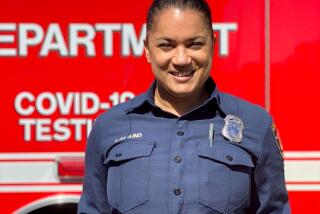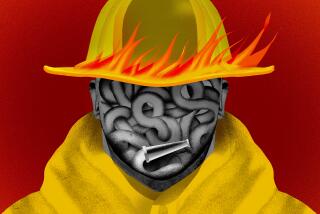Giving Back : Mentoring Peers, Partnering Kids
- Share via
Since I came on the department 8 1/2 years ago, I’ve been a member of the Stentorians because of their helping me get on the fire department and also because of their involvement in the community. We have a saying in the International Assn. of Black Professional Firefighters, “All that I have, I owe.” The people who came before me went through so much racism and discrimination that I will not feel comfortable unless I can assist [others] to attain a career with the fire service.
Stentorians act as mentors, first and foremost. For a long time within the department there’s been an attitude [on the part] of some members to berate some minorities, such as women and African Americans, rather than assist them in a positive way to learn things.
Every probationary firefighter has to do a daily proficiency examination or drill to prove they understand the workings of a piece of equipment or a technique. The probationary firefighter may not feel comfortable or may not be able to get that kind of assistance from the people they’re working with at the station, so they ask for assistance from our organization. We also have an upward mobility program through which any member of the organization can go through a yearlong course that helps them prepare for promotional examinations.
The Stentorians are very involved in the community. After the rebellion in 1992, for two days we gave away food, diapers, basic necessities, at our center at the corner of Normandie and Vernon. We were able to provide a service above responding on a red fire engine. We didn’t just serve African Americans; there were a lot of Hispanics and Caucasians.
We’re also involved in a mentor program at two housing projects, Avalon Gardens and Pueblo del Rio in Los Angeles. We have an administrator and two on-site counselors who provide daily activities for the children. Sometimes it’s sports; sometimes it’s arts and crafts, and sometimes it’s a lecture series on important African Americans. We’re attempting to work with the resident advisers at each site so we can better tailor our activities.
Firefighters work a total of 10 24-hour shifts a month. That gives us some time to devote to the community. As a fire inspector, I work four 10-hour days. We require all new members to donate a minimum of 12 hours a year.
Aquil Basheer, also a fire inspector, runs a self-esteem program for youth based on martial arts. It offers children self-esteem through discipline and physical training. He donates about 20 hours a week.
We’ve tried to be very visible in the community by providing first aid at events such as the annual African Marketplace and the Black Family Reunion. In exchange, we ask to recruit for the fire department.
We want people to see African American firefighters, both men and women, who care about the community that they’re serving. We want to make sure that the youngsters in the community are aware that they have a rich heritage and they can have a career in the fire department or anything they want.
More to Read
Sign up for Essential California
The most important California stories and recommendations in your inbox every morning.
You may occasionally receive promotional content from the Los Angeles Times.













